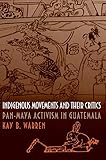Indigenous Movements and Their Critics : Pan-Maya Activism in Guatemala / Kay B. Warren.
Material type: TextPublisher: Princeton, NJ : Princeton University Press, [2021]Copyright date: ©1999Description: 1 online resource (334 p.) : 1 table 2 maps 19 line illus. 56 halftonesContent type:
TextPublisher: Princeton, NJ : Princeton University Press, [2021]Copyright date: ©1999Description: 1 online resource (334 p.) : 1 table 2 maps 19 line illus. 56 halftonesContent type: - 9780691225302
- Indians of Central America -- Guatemala -- Government relations
- Mayas -- Guatemala -- Ethnic identity
- Mayas -- Guatemala -- Government relations
- Mayas -- Guatemala -- Politics and government
- SOCIAL SCIENCE / Anthropology / General
- Black Legend
- Bourgois, Philippe
- Catholic Action
- Chávez, Adrián
- Commission on Sacred Sites
- Concepción
- Farriss, Nancy
- Florentine Codex
- Gudeman, Steve
- Hanks, William
- Hispanization
- Iximulew
- Ladinoization
- Ladinos
- activism, Ixim family and
- agrarian reform
- amnesty program
- anthropology
- antiracism narratives
- assimilation
- brutality, Spanish
- campesinos
- chronicles, Spanis
- cooperative movement
- cultural capital
- culture loss
- democracy
- divining
- ecology
- education
- essentialism
- ethnic mobilizing
- federalism
- fieldwork
- gender issue
- globalization
- historical consciousness
- human rights
- identity politics
- identity transformation
- indigenous movements
- individualism, and ethnicity
- internalization of violence
- intolerance, religious
- kaibiles
- kaxlan
- land issues
- linguistics
- marriage negotiation
- master of the mountain
- militarization of civilian life
- mythistories
- F1465.3.G6
- online - DeGruyter
| Item type | Current library | Call number | URL | Status | Notes | Barcode | |
|---|---|---|---|---|---|---|---|
 eBook
eBook
|
Biblioteca "Angelicum" Pont. Univ. S.Tommaso d'Aquino Nuvola online | online - DeGruyter (Browse shelf(Opens below)) | Online access | Not for loan (Accesso limitato) | Accesso per gli utenti autorizzati / Access for authorized users | (dgr)9780691225302 |
Frontmatter -- Contents -- Preface -- Acknowledgments -- Transcription of Maya Languages and Personal Names -- Introduction. Democracy, Marginality, and Ethnic Resurgence -- One. Pan-Mayanism and Its Critics on Left and Right -- Two. Coalitions and the Peace Process -- Three. In Dialogue: Maya Skeptics and One Anthropologist -- Four. Civil War: Enemies Without and Within -- Five. Narrating Survival through Eyewitness Testimony -- Six. Interrogating Official History -- Seven Finding Oneself in a Sixteenth-century Chronicle of Conquest -- Eight "Each Mind Is a World": Person, Authority, and Community -- Nine Indigenous Activism across Generations -- Conclusions Tracing the "Invisible Thread of Ethnicity" -- Appendix One Summary of the Accord on Identity and the Rights of Indigenous Peoples -- Appendix Two Questions from the 1989 Maya Workshop Directed to Foreign Linguists -- Glossary Acronyms, Organizations, and Cultural Terms -- Notes -- Bibliography -- Index
restricted access online access with authorization star
http://purl.org/coar/access_right/c_16ec
In this first book-length treatment of Maya intellectuals in national and community affairs in Guatemala, Kay Warren presents an ethnographic account of Pan-Maya cultural activism through the voices, writings, and actions of its participants. Challenging the belief that indigenous movements emerge as isolated, politically unified fronts, she shows that Pan-Mayanism reflects diverse local, national, and international influences. She explores the movement's attempts to interweave these varied strands into political programs to promote human and cultural rights for Guatemala's indigenous majority and also examines the movement's many domestic and foreign critics. The book focuses on the years of Guatemala's peace process (1987--1996). After the previous ten years of national war and state repression, the Maya movement reemerged into public view to press for institutional reform in the schools and courts and for the officialization of a "multicultural, ethnically plural, and multilingual" national culture. In particular, Warren examines a group of well-known Mayanist antiracism activists--among them, Demetrio Cojt!, Mart!n Chacach, Enrique Sam Colop, Victor Montejo, members of Oxlajuuj Keej Maya' Ajtz'iib', and grassroots intellectuals in the community of San Andr s--to show what is at stake for them personally and how they have worked to promote the revitalization of Maya language and culture. Pan-Mayanism's critics question its tactics, see it as threatening their own achievements, or even as dangerously polarizing national society. This book highlights the crucial role that Mayanist intellectuals have come to play in charting paths to multicultural democracy in Guatemala and in creating a new parallel middle class.
Mode of access: Internet via World Wide Web.
In English.
Description based on online resource; title from PDF title page (publisher's Web site, viewed 07. Nov 2022)


